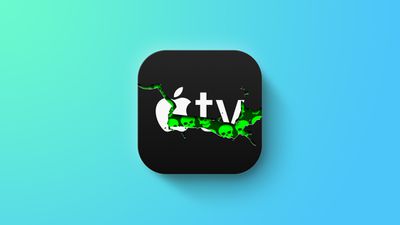As the popularity of Apple TV+ grows, Apple appears to be struggling to contend with increasing levels of online piracy, despite concerted efforts to take down its stolen content, MacRumors has found.

Piracy is a lucrative business for torrent sites, with a report from August estimating that the top five piracy websites raise around $18.3 million in ad revenue and sponsorships per year. According to the Alliance for Creativity and Entertainment (ACE), streaming piracy represents up to 80 percent of piracy, costing companies as much as $71 billion annually.
Although Google has increasingly cracked down on websites that host pirated content, site operators often change domains and redirect users to avoid takedowns and keep torrent links accessible. In a research paper published in 2018, Google conceded that there will "be new sites dedicated to making copyrighted works available as long as there is money to be made doing so."
Apple largely avoided the need to combat online piracy until the launch of Apple TV+ in November 2019. Since then, Apple TV+ shows and movies have proliferated throughout piracy sites across the internet.
While Apple has a clear piracy prevention statement for software, this does not extend to its video entertainment content, which is instead covered by Apple's terms and conditions of service. From MacRumors' findings, some of Apple's most popular shows and movies have at least 2,000 active seeders on each major piracy site, going up to as many as approximately 125,000 seeders per title. Download trends broadly map to the popularity of Apple's various shows and movies, with the likes of "Ted Lasso," "The Morning Show," and "SEE" garnering the most downloads.
Apple is a governing member of the Motion Picture Association of America's ACE, an influential anti-piracy group committed to "supporting the legal marketplace for video content and addressing the challenge of online piracy" that also includes Netflix, Amazon, Comcast, Disney, NBC, MGM, ViacomCBS, Paramount, Fox, NBCUniversal, Sony Pictures, Warner Bros., and others. Apple also works with the Software and Information Industry Association (SIIA).
Streaming production studios and distributors, such as Netflix, Amazon Prime Video, and Disney+, have attempted to curtail the illegal sharing of movies and TV shows using specific enforcement partners who flag stolen content on their behalf. Apple has followed suit, inking working deals with multiple firms specializing in digital copyright protection, including Corsearch Inc. and OpSec Security. They operate by issuing DMCA takedown orders for pirated online content.
According to information accessed by MacRumors, Corsearch has issued more than 320,000 DMCA orders to Google, citing copyright infringement for Apple TV+ content. These orders only stop Google from indexing flagged piracy sites and do little to curtail the actual hosting of pirated content. Delist requests on Apple's behalf reached an all-time high on August 16 this year, with more than 8,500 requests to Google in a single day.
MacRumors tracked numerous domains and URLs used to pirate Apple TV+ content and found that none were taken down by Apple or its partners over the course of a week. On the contrary, during this period, the website's catalog of stolen Apple TV+ content grew, sometimes within just hours of new episodes being released on Apple TV+ itself.
Apple and its partners must issue DMCA orders to the websites themselves to get them taken down, a process that can be cumbersome. To make matters more complex, some sites do not host Apple TV+ content directly but act as an aggregator for content hosted elsewhere.
The websites we tracked were hosted by Cloudflare, a popular web infrastructure company that provides digital security and CDN, or content delivery network. As outlined in its abuse policy, Cloudflare cannot take sites down as it does not directly host them. Instead, it can redirect cases of reported digital copyright infringement to the piracy site's hosting provider or owner.
Actioned DMCA orders show that Apple and its partners tend to focus on more obscure websites that host Apple TV+ content infrequently rather than more persistent, larger piracy sites hosting Apple TV+ content in larger swathes.
Although 91.2 percent of Apple's delist requests were successfully actioned, the growth and availability of Apple TV+ content on torrent sites does not seem to have been significantly impeded by its efforts, with the company firmly falling into the same issues experienced by its rivals in the entertainment industry. Apple, Corsearch, and OpSec declined to respond to requests for comment.





















